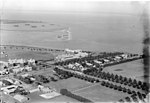Lara Secondary College
2003 establishments in AustraliaCity of Greater GeelongEducational institutions established in 2003Public high schools in Victoria (state)Use Australian English from November 2019 ... and 1 more
Victoria (state) school stubs
Lara Secondary College is a public co-educational secondary school located in Lara, Australia, which shares fences with a local primary school Lara Primary School. Lara secondary college accommodates approximately 900 students from years 7–12. The school officially opened, taking just year 7 students, on the current site in 2003. As of 2008 Lara Secondary College was a complete secondary school having grades from year 7 to 12 attending. At the beginning of the 2012 school year, all of the renovations had been completed and a new more modernistic building had been built for the year 7 and 8 students.
Excerpt from the Wikipedia article Lara Secondary College (License: CC BY-SA 3.0, Authors).Lara Secondary College
Alkara Avenue, City of Greater Geelong
Geographical coordinates (GPS) Address External links Nearby Places Show on map
Geographical coordinates (GPS)
| Latitude | Longitude |
|---|---|
| N -38.018 ° | E 144.4114 ° |
Address
Lara Secondary College
Alkara Avenue 34
3212 City of Greater Geelong
Victoria, Australia
Open on Google Maps






